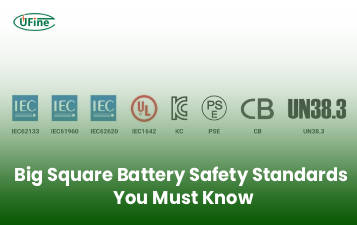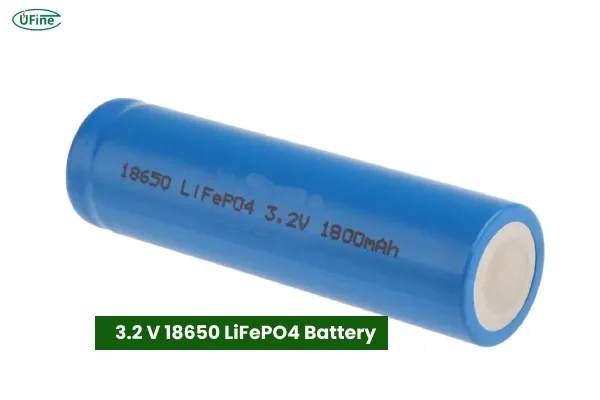
- Part 1. What is an 18650 LiFePO4 battery?
- Part 2. Understanding LiFePO4 chemistry
- Part 3. Key benefits of 18650 LiFePO4 batteries
- Part 4. Technical specifications of 18650 LiFePO4 cells
- Part 5. LiFePO4 vs Li-ion: which 18650 battery is better?
- Part 6. Top applications of 18650 LiFePO4 batteries
- Part 7. How to choose the right 18650 LiFePO4 battery
- Part 8. Charging guidelines for 18650 LiFePO4 batteries
- Part 9. Storage and maintenance tips
- Part 10. Safety considerations
- Part 11. Where to buy quality 18650 LiFePO4 batteries
- Part 12. Is the 18650 LiFePO4 battery right for You?
Part 1. What is an 18650 LiFePO4 battery?
An 18650 LiFePO4 battery is a rechargeable lithium-ion cell that uses lithium iron phosphate (LiFePO4) as the cathode material and typically comes in a cylindrical 18mm x 65mm size—hence the name 18650. Unlike traditional lithium cobalt oxide (LiCoO₂) cells, LiFePO4 batteries offer greater chemical stability, making them safer and more durable over long-term use.
These batteries are often used in solar storage, electric vehicles, medical devices, LED lighting, and various portable electronics where safety and lifespan are top priorities.
Part 2. Understanding LiFePO4 chemistry
LiFePO4 is part of the broader family of lithium-ion battery chemistries but stands out due to its unique characteristics:
- Thermal and chemical stability: LiFePO4 batteries are far less likely to overheat, catch fire, or undergo thermal runaway.
- Flat discharge curve: These batteries maintain a consistent voltage during discharge, which is especially useful in devices requiring stable output.
- Environmentally friendly: Compared to other lithium chemistries, LiFePO4 has lower environmental toxicity and no cobalt.
This makes LiFePO4 an ideal choice for users prioritizing safety, sustainability, and long-term performance.
Part 3. Key benefits of 18650 LiFePO4 batteries
Here’s why many industries and consumers are shifting to 18650 LiFePO4 cells:
Safety
LiFePO4 batteries are known for their intrinsic safety features. They are non-combustible, even when punctured or subjected to harsh charging conditions.
Longer Cycle Life
These batteries can typically endure 2,000 to 5,000 charge/discharge cycles, significantly outperforming traditional lithium-ion cells, which usually offer 500–1,000 cycles.
High Temperature Tolerance
LiFePO4 chemistry operates reliably in a wider temperature range, from -20°C to +60°C, making it suitable for outdoor or industrial use.
Stable Voltage Output
With a nominal voltage of 3.2V and a very flat discharge curve, devices can run at stable power for longer periods without significant drops in performance.
Part 4. Technical specifications of 18650 LiFePO4 cells
When evaluating an 18650 LiFePO4 battery, the following specs are essential:
- Nominal Voltage: 3.2V
- Full Charge Voltage: 3.65V
- Typical Capacity: 1,000–1,500mAh per cell (lower than standard Li-ion, but with better safety and life)
- Standard Discharge Current: 1C–3C (continuous)
- Cycle Life: 2,000+ cycles
- Operating Temperature: -20°C to 60°C
- Weight: ~40–50 grams depending on the build
These specifications may vary based on the manufacturer and application. Customizations are also possible, which is where suppliers like Ufine Battery provide significant value.
Note: Ufine Battery is a Chinese custom lithium battery manufacturer offering high-quality 18650 LiFePO4 batteries tailored to different voltage, capacity, and size requirements. Whether you need standard cylindrical cells or specialized high-temperature variants, Ufine can deliver quickly with customizable solutions. Contact us now!
Part 5. LiFePO4 vs Li-ion: which 18650 battery is better?
While both are lithium-based, LiFePO4 and Li-ion (e.g., LiCoO₂, NMC) have key differences:
| Feature | LiFePO4 | Li-ion (LiCoO₂/NMC) |
|---|---|---|
| Safety | Very High | Moderate |
| Energy Density | Lower (90–120 Wh/kg) | Higher (150–250 Wh/kg) |
| Cycle Life | 2,000–5,000 cycles | 500–1,000 cycles |
| Operating Temp | Wider (-20°C to 60°C) | Narrower (0°C to 45°C) |
| Cost | Slightly Higher | Moderate |
If you value long lifespan, safety, and durability, LiFePO4 is the better choice. If compact size and higher energy density matter more (e.g., for drones), standard Li-ion may be preferred.
Part 6. Top applications of 18650 LiFePO4 batteries
Due to their stability and longevity, 18650 LiFePO4 batteries are ideal for:
- Solar Energy Storage: Store power efficiently and safely, especially in remote or off-grid installations.
- Emergency Lighting Systems: Dependable backup power during outages.
- E-Bikes and Scooters: Safe and sustainable energy for mobility.
- Medical Devices: Reliability is crucial, and LiFePO4 delivers.
- Uninterruptible Power Supplies (UPS): Maintain power for servers, telecom, or industrial control systems.
- DIY Power Banks and Flashlights: Custom battery packs for hobbyists and professionals.
Ufine Battery supports various industries with tailor-made 18650 LiFePO4 solutions, providing not only the core cells but also complete battery packs with integrated BMS (Battery Management Systems) for high-reliability applications.
Part 7. How to choose the right 18650 LiFePO4 battery
Choosing the best battery involves evaluating:
• Capacity & Voltage Needs
Ensure the nominal voltage (3.2V) aligns with your device’s requirements. Capacity (in mAh) determines how long the battery lasts.
• Discharge Rating
Check the Continuous Discharge Rate (CDR) to match your power draw needs. A 2C-rated battery can safely discharge at 2x its capacity.
• Protected vs Unprotected
Protected cells include an internal circuit to prevent overcharging or short-circuiting. They’re safer but slightly longer.
• Flat-Top vs Button-Top
Flat-top cells are common in packs, while button-tops are used in flashlights and standalone devices.
Ufine Battery offers customization for all these parameters—voltage, capacity, rate, terminal type—allowing OEMs and hobbyists to get exactly what they need.
Part 8. Charging guidelines for 18650 LiFePO4 batteries
LiFePO4 batteries require specific charging protocols for safety and longevity:
- Charge Voltage: Maximum 3.65V per cell
- Charge Current: Usually 0.5C to 1C (e.g., 1A for a 1000mAh cell)
- Charger Type: Use a LiFePO4-specific charger—not a standard Li-ion charger
Using incorrect chargers can overcharge the battery and pose safety hazards. Look for smart chargers with CC/CV (Constant Current/Constant Voltage) modes designed for 3.2V cells.
Ufine can also assist in designing complete battery + charger systems for industrial or consumer products.
Part 9. Storage and maintenance tips
To maximize lifespan:
- Store at 40–60% charge if not in use for long periods
- Keep in a cool, dry place, ideally between 10–25°C
- Avoid full discharges—LiFePO4 doesn’t have memory effect, but deep discharging shortens lifespan
- Inspect regularly for swelling, rust, or leakage
With proper care, a LiFePO4 battery can maintain >80% capacity even after 2,000+ cycles.
Part 10. Safety considerations
Although safer than other lithium chemistries, LiFePO4 batteries still need to be treated with care:
- Use a BMS: Overcharge, over-discharge, and short-circuit protection
- Avoid mechanical damage: Dropping or puncturing cells can still lead to failure
- Don’t mix cell types in a pack—always use identical cells in terms of capacity and age
Ufine Battery can integrate BMS and thermal protections into custom battery packs, offering clients plug-and-play solutions with built-in safety.
Part 11. Where to buy quality 18650 LiFePO4 batteries
When sourcing 18650 LiFePO4 batteries, quality control and customization are key:
Trusted Suppliers
- Look for manufacturers with certifications (CE, RoHS, UL)
- Read datasheets and verify specs before purchasing
- Avoid no-name or unverified sellers on marketplaces
Why Choose Ufine Battery?
Ufine Battery is a reliable Chinese manufacturer specializing in:
- Custom lithium batteries for OEMs and project developers
- Quick delivery of 18650 batteries in both LiFePO4 and Li-ion chemistries
- Flexible design: Voltage, size, terminals, rates, and pack configurations tailored to your project
Whether you need a prototype run or mass production, Ufine Battery combines factory-direct pricing with high-end engineering support.
Part 12. Is the 18650 LiFePO4 battery right for You?
If your application demands safety, stability, and long life, the 18650 LiFePO4 battery is one of the best options on the market. Although it offers slightly lower energy density than other lithium chemistries, its benefits in thermal stability, cycle durability, and consistent voltage make it ideal for energy storage, mobility, and mission-critical electronics.
Whether you’re building a solar battery bank, upgrading a mobility device, or developing a custom industrial application, partnering with an experienced supplier like Ufine Battery ensures you get performance, safety, and peace of mind.
Related Tags:
More Articles

Big Square Battery Safety Standards You Must Know
Learn key safety standards for big square batteries to avoid fire risks, shipping delays, and compliance issues in EV, industrial, and energy storage projects.
Big Square Battery Applications in Solar & Industrial Equipment
Big square batteries deliver high capacity, stable output, and long life for solar, industrial, and backup power. Explore key uses and advantages.
Big Square Battery vs Cylindrical Battery: Complete 2025 Guide for EVs, ESS & Industrial Devices
Choosing the right battery is key for designers and engineers. Compare big square vs cylindrical batteries to find the best fit for your application.
How to Choose the Right Big Square Battery for Your Device?
If you’re choosing a big square battery for EVs, solar, or mobility devices, this guide helps you pick the right solution for real-world needs.
Big Square Battery Complete Guide: Types, Uses & Buying Tips
If you are choosing a big square lithium battery for EVs, solar, RVs, or AGVs, this guide helps you select the right NMC, LFP, or LTO solution with examples.



